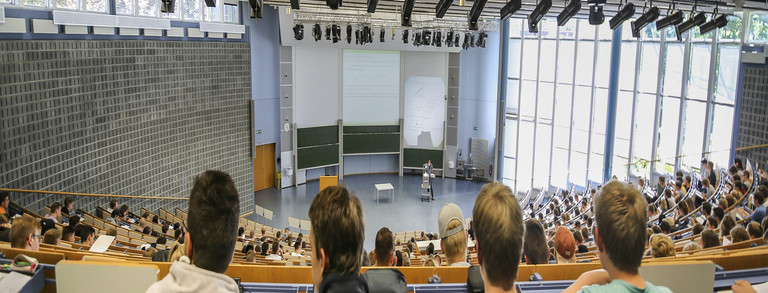Religion, Ethics, and Politics
Summary
| Degree | Master of Arts (M.A.) |
|---|---|
| Subject group | Social Sciences and Cultural Studies |
| Standard program duration | 4 semesters |
| Admission requirements |
none
|
| Start of studies |
Winter semester
Summer semester |
| Language | English |
| Enrollment requirements | |
| Further information | Website of the Master's Program ‘Religion, Ethics, and Politics’ |
| Department | Department of Humanities and Theology |
Overview
Only a few decades ago, it was assumed that religion and religiosity would lose their significance in the public sphere in the long term. On the contrary, in recent years (in Western Europe) the relationship between religion and politics has become a topic that increasingly dominates social and political as well as academic debates. These debates are triggered by a new visibility of religion in the public sphere, which can be attributed to various causes, e.g. religious pluralization, changing moral concepts, but also globalization. How tolerant should society be towards the cultural customs of minorities, for example, and which values, such as equal rights for women and men, should not be open to discussion - these are concrete example questions that the master's program deals with.
The Master’s degree program „Religion, Ethics, and Politics“ (MaREPol) enables students to address and understand the relationship between the spheres of religion, society, and politics and the challenges that result from the complex field of tension, and to develop interdisciplinary approaches to solving them.
Complex societal challenges at the intersection of religion, ethics, and politics increasingly require interdisciplinary solutions. This is made possible by systematically bringing together philosophical, political science, and theological perspectives. Two disciplines each make a decisive contribution to the topic-oriented interfaces (clusters) Tolerance, Conflict and Identity. Overall, the program is covered by all institutes located at the faculty. Students choose two of the three clusters. In the clusters, seminars on selected issues open up different methods and perspectives. In addition to Christianity, the basic module also focuses on Islamic Studies and Jewish Studies. Without them, problem analyses of modern societies would be incomplete.
Skills and knowledge
The prerequisites for admission to the Master’s degree program ‘Religion, Ethics and Politics’ are as follows:
1) A Bachelor’s degree (or equivalent) in humanities, cultural sciences, social sciences, economics, natural sciences, and/or engineering, which has provided significant knowledge in a philosophical, political science or a theological subject;
2) The overall grade achieved in the Bachelor’s degree should be at least „good“ (Grade: 2.5) or better. (If you have a foreign degree, your grade must be converted into the German grading system.)
3) All courses are taught in English. Therefore, applicants have to provide proof of the language level B2 (or better) of the Common European Framework of Reference for Languages. Language skills can be proven as follows:
- Proof of English language skills in a German high school diploma
- Through an internationally recognized language certificate (for example TOEFL; IELTS) or comparable certificate
- By attending an English-speaking school for at least one year
- Applicants whose native language is English or who have obtained a degree in an English program.
Field of activity
MaREPol offers a lot of room for individual interests and career aspirations. Already today, former students of our faculty have pursued their career in the following professional fields:
- International organizations and diplomacy
- Political management, political consulting
- Associations, publishing houses, foundations
- Business consulting
- Research and teaching.
Additional information
MaREPol gives you the chance to focus on perspectives within or outside academia. That means that besides the chance to prepare for a scientific career, you will attend a course in project management where you acquire application-oriented knowledge and skills. Furthermore, you are offered the opportunity to do an internship in various areas such as national or international organizations, political parties, media institutions, NGOs, or a religiously oriented institutions. Additional to the curriculum, students can go abroad on an Erasmus stay for one semester to enjoy academic exchange, gain international experience, and improve their language skills.




![[Translate to English:] Partner Four hands are holding the green logo of TU Dortmund University](/storages/tu_website/_processed_/1/d/csm_Partner_Nicole_Rechmann_KW_40b35bb3fd.jpg)




![[Translate to English:] Forschung An apparatus with tubes in a laboratory](/storages/tu_website/_processed_/0/c/csm_Forschung_Juergen_Huhn_cbd34afd6d.jpg)
![[Translate to English:] Studium Five students are sitting in a lecture hall. They are talking to each other.](/storages/tu_website/_processed_/c/9/csm_Studium_FelixSchmale_81d94adc86.jpg)





